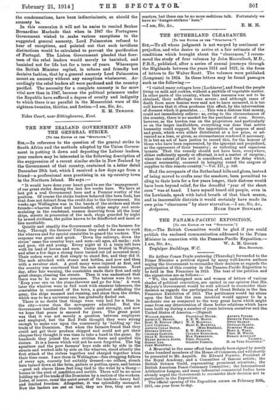THE NEW ZEALAND GOVERNMENT AND THE GENERAL STRIKE.
[To sus Emma or rue ..arsersrea."1
thn,—In reference to the question of the general strike in South Africa and the methods adopted by the Union Govern- ment in putting it down and deporting the Labour leaders, your readers may be interested in the following description of the suppression of a recent similar strike in New Zealand by the Government of that country, contained in a letter dated December 29th last, which I received a few days ago from a friend—a professional man practising in an up-country town in the Northern Island. He says :-
"It It would have done your heart good to see the 'management of our great strike during the last few weeks here. We have at last got a real Government here and a Premier worthy of the position. Of course the strike leaders behaved like born fools, but that does not detract from the credit due to the Government. Six weeks ago Wellington was in the hands of the strikers and their friends—wharves silent and barricaded, ships empty and accu- mulating in the roadstead, seamen deserting from all the local ships, streets in possession of the mob, shops guarded by night by armed civilians, the police known to be disaffected and more or less unreliable.
Quietly and steadily the Government called to the farmers for help. Through the farmers' Unions they asked for men to work the wharves and for special constables to guard the workers. The response was great and quick. 'Down the railways, down the rivers' came the country boys and men—all ages, all ranks rich and poor, old and young. Every night at 11 a train left here with its load of horses and men. Camps formed in Wellington, and after a few days a strong force turned not (of mounted men). Their orders were at first simply to stand fire, and they did it. The mob attacked with stones and bottles, and now and then with a revolver shot. A good many were injured at first, and the country was convinced that the mob meant business. Next day, after fair warning, the constables made their first and only great charge, clearing the streets. Then it was understood that there was to be no more nonsense. The batons were for use. ' Keep your eye on the stone-thrower and go for him.' A week later the wharves were in full work with amateur labourers, the constables in command of the town, a gunboat enfilading the quay, the ships manned and running, and since then the strike, which was to be a universal one, has gradually fizzled out. There is no doubt that things were very bad for a time in the city—worse than the newspapers admitted. But the Government handled the trouble coolly and strongly, and now we hope that peace is ensured for years. The great point was that it was not merely a question between employers and employed, but the Red Feds thought they were strong enough to slake war upon the community by 'holding up' the trade of the Dominion. But when the farmers found that they could not get their produce shipped and could not get their cheques they thought it was time to take a hand in the game. By hundreds they joined the new civilian force and quelled the rioters. It is a lesson which will not be soon forgotten. The big squatters and the poor farmers' boys rode side by side in the streets and worked side by side on the wharves, stood silently the first attack of the rioters together and charged together when their time came. I saw them in Wellington—line strapping fellows of every age, coarsely but suitably dressed—no collars, slouch hats turned down at the brim, gaiters or putties, spurs, and batons —good oak staves three feet long tied to the wrist by a thong— horses in the pink of condition and mettle. There will be no more holding up of the trade of the Dominion by a section of the workers. Later, of course, came the quiet arrest of the leaders—heavy bail and limited freedom. Altogether, it was splendidly managed. Now the leaders are Out on bail, they are free, they are not martyrs, but there can be no more seditious talk. Fortunately we have no `hunger-strikera ' here."














































 Previous page
Previous page